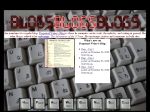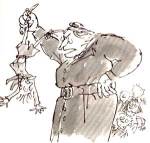it’s a trip . . .
tips, quotes, insights, and lessons about writing and publishing learned the hard wayQuirks, anyone?
I like quirks in characters. In my favorite cozy mystery series written by the late Lawrence Sanders, Archie McNally has many of them–from unusual clothes items such as colorful berets to telling you what he eats at every meal to pet sayings such as, “One never knows, do one?”
I think quirks can elevate characters above stereotypes, too. Though I’ve met some unusual people, I can’t say most of the people I know are quirky. (But then I wouldn’t want to read about them either.) Whenever I’ve met someone in real life with a quirk, it’s always stuck with me, and some of my family members and friends have found themselves in my stories. For instance, my older brother is very anal retentive about his pepper. He has seven kinds of pepper, each in its own mill, clearly labeled, and arranged on his stove top from mild to hot. Well, I couldn’t let that juicy little item go by. Of course I gave my FBI agent some anal retentive qualities and used those pepper mills in his kitchen, causing the protagonist to say, “Seven mills? Sounds like a tax rate.”
Anyhoo, so if you don’t know particularly quirky folks whose habits you can infuse into your characters or if you suffering from brain drain and can’t think of any qualities particular different or downright strange with which to imbue your characters, then you need to hit some sites that role players use. Role players have identified tons of quirks on their websites and forums, more than you could ever think of if you sat down to come up with quirks and had an endless supply of paper, two free hours, and a Red Bull.
For example, I spent less than a minute on a Dungeons & Dragons forum called 1001 Character Quirks and found lists of tasty quirks such as:
- keeps a bag filled with little jars of dirt from each nation he’s been to
- insomniac
- contradicts everyone about absolutely anything even the pointless things
- constantly catches bugs and keeps them as pets in containers, isn’t aware of their need for sustenance and is deeply upset when they die
- always steals people’s stories and doesn’t keep track of which story came from who hence occasionally tells a stolen story to the person he stole it from.
- has an obsession with peoples ears or other body part
Then of course there’s a blog post called 100 Character Quirks You Can Steal From Me.
And many, many other rich sources you can find within minutes on the Web.
Now, of course, you can’t stuff all these quirks into your book characters. But if you carefully choose one or two, you may end up with a much more novel novel than you ever imagined.
By the way, pardon my infrequent posting. I’m doing NaNoWriMo this year and am going to try my very best to hit that 50,000 word count and be a winner this year.
Contests… for cash and prizes!
Just wanted to share a few upcoming writing contests with readers.
Narrative is hosting its 2008 fiction contest entitled EVERYTHING IS TRUE . . . or becomes so later for short stories, short short stories, and novel excerpts. Deadline is November 30. For more details, click here. Narrative contests are very competitive. Recently Gina Ochsner won one of their contests. Her work is widely published. I have one of her short story collections.
Sonora Review is hosting a short-short fiction contest, with entries due December 1. More information is available at this link. They claim an interest in publish and emerging writers.
Finally the 9th Annual Writers Digest Short Short Story Competition is now accepting entries through December 1. More information is available by clicking this link.
At least two of those contests require an entry fee per piece–Sonora and Writer’s Digest. Some sites suggest never entering a contest that charges an entry fee; however, if you want your piece to be judged by someone whose time is valuable, I would argue that some contest fees are not only acceptable but reasonable. What person of any value and influence can afford to give away his/her time?
So, look at the prizes awarded in comparison to the entry fee before you pass judgment on a contest. If the entry fee is $15 but first price is a cool thousand, that seems like a reasonable fee to me whereas if the entry fee is $15 and the top prize is $100, I would say that contest is not worth your time.
I plan to shore up a few pieces to enter in these contests tomorrow when my mind is fresh. Not because I’m a glutton for punishment but because I feel as if I have a piece or two capable of winning. And winning improves your platform.
And you can’t win if you don’t play.
Lessons learned from friends . . . Ian Healy
Feel free to argue this point, but the thing that separates the successful from the unsuccessful, the published from the unpublished is sheer perseverance–to keep writing, writing, writing–through block, snow, sleet, hail or dark of mind.
I can’t name another writer in my acquaintanceship who better exemplifies perseverance and gritty determination than Ian Healy.
I don’t know how he does it. He’s already written 15,000+ words on his novel during National Novel Writing Month (NaNoWriMo). I have 4,700 words, and I feel successful. He’s topped 15K and feels like he’s failing.
He’s also done NaNo numerous times, earning badges for completing his 50,000 words in several successive Novembers.
He’s got two blogs, he authors a web comic, and one of his books was named to the top 100 in the Amazon Breakthrough Novel Contest last year. And when I blogged regularly, he always made it around to a lot of people’s blogs and made comments, mine included.
I was supposed to have posted this yesterday, but I ended up going to bed early. I was up way too late on election night.
But as soon as I put this post to bed, I intend to go add to my measly word count, inspired by writing mate Ian Healy.
Yes, Ian’s work deserves to be published. But make no mistake about it. When it is published, it will be because he’s earned it. He works harder than any other writer I know.
And I will always fall short, by comparison, but am nonetheless awed by his determination.
on winners and non-winners, also known as losers
I don’t have a lot to say in this post other than sharing an important personal observation I made and felt sink into my bones after the Philadelphia Phillies won the World Series Wednesday. A local cable interviewer was talking to one of the players. (In case you don’t know, Philadelphia fans have died a thousand deaths over the last twenty-five years because our teams either never get to the championship rounds or have choked miserably the few times they did. Philadelphia is forever fighting the perception that it’s a city of losers).
Anyway, one player essentially said (I can’t remember which one), “Winning the World Series has given us so much cred. You’re just not a winner until you win.”
I know the same holds true for writers. Sure we can all tell each other we’re winners in God’s eyes, which is great when one is facing her eternal reward, but not so great, say, when one is going face-to-face with bullies and people who dismiss you because you haven’t made it.
It only takes one published book to change all that–to go from wannabe to winner, to earn that cred most writers richly desire and many deserve.
As someone new to writing and publishing (I’m a toddler in dog years), I know I don’t have the cachet of a published author. This week I presented my workshop for the Literary Festival on writing flash fiction at the university. All the important people at the university couldn’t attend–my boss didn’t show, the president took me off his calendar, and a close friend and supporter never showed up either (although some other “lesser” colleagues did, for which I am eternally grateful, which I say sarcastically, because I’m very happy and humbled that they came).
I got an email from a high school friend who had seen my workshop in the paper and said, “Oh, I really wanted to come but I don’t have my lesson planning done for the afternoon.”
Oh, well . . .
If I were a published author, I doubt she would have brushed off my workshop. What she and others don’t know is that I feel I’m on the cusp of being published, that sooner rather than later, some literary agent will snap me up, and one of my books will get published. I know it in my heart and my bones. Maybe not this year, but soon. Heck, I’ve only been at this creative writing stuff for three and a half years.
But until that time, I just have to accept that others have a dimm ed perception of my value as a writer, that I’m not a winner in their eyes until I’ve won.
And that’s not necessarily a bad thing. Justice is wonderfully motivating.
It’s a reality of the times we live in, and perhaps each era before us. If the Philadelphia Phillies can endure all the injustices they have–I mean just last year, everyone was calling them “the losing-est franchise in the major leagues” after the Phillies franchise accumulated its 10,000th loss in franchise history–I guess I can suffer a few slings and arrows for a little longer, too.
You’re just not a winner until you’ve won.
The Big Five from George Orwell
This year I was a presenter in the Greater Reading Literary Festival. I did a workshop on how to write flash fiction for campus community members who attended over their lunch hours, or in the case of some students, whose teachers sent them there, who were easy to spot–they were the ones sleeping in the back.
I was looking for some pithy advice to share with workshopees and found these tenets by George Orwell, which I now post for you.
1. Never use a metaphor, simile, or other figure of speech which you are used to seeing in print.
2. Never use a long word where a short one will do.
3. If it is possible to cut a word out, always cut it out.
4. Never use the passive where you can use the active.
5. Never use a foreign phrase, a scientific word, or a jargon word if you can think of an everyday English equivalent.
Out of the entire Serengeti of writing advice available on the Internet, I thought these were five predators worth pursuing. (Just so you know, I could have said “pantheon of writing advice,” but then I would violating number one of the big five, so I tried to go for something fresher since I violated number four in saying “were worth pursuing”.)
If we could write or at least edit our work adhering to these five rules, our writing would improve in elephantine proportions.
I’m inclined to use too many words, too many big words, and not to work hard enough to come up with an original figure of speech.
How about you, dear readers? Are you stalked by any of these big five ?
Literary Festival pearls
This month, the university where I work is hosting a literary festival. Two of the presenters this week, both published authors, impressed me, and I came away from their presentations with a few pearls to share with “It’s a Trip” readers.
Author and Pulitzer Prize-winner Richard Russo spoke to a crowd of 100+ Tuesday night. He is a man of good writing habits, setting aside time to write every day. Okay, he’s a full time writer. But anyone can carve out some time to write every day or every other day. And if you can’t or if I can’t–I think I am talking to myself here–I don’t know how I can expect to have success as a fiction writer.
Russo also read a story, which illustrated that some people look at things and find them funny and some don’t, and that he gravitates to the humorous in any situation. But that doesn’t make his take on life any less valuable than a serious person’s vantage point. I certainly am drawn to humorous, so I felt validated by his assertion that good writers can be funny, too, that they are not mutually exclusive. Sometimes I try too hard to be funny–I’ll concede that–but I do feel as though my writing has been unfairly discounted because it’s funny. The judge in my long-running fiction contest over the last several months discounted my pieces as less worthy because they were funny.
Russo’s sharing his own vantage point he comes by naturally was validation for me to keep on being me.
The other writer/presenter who impressed me was Rachel Pastan. Rachel also is a creature of good writing habits despite having two school-age children who provide many distractions. Rachel’s publishing career is also a testament to perseverance. She wrote two novels which were never published, but she kept at it and finally published THIS SIDE OF MARRIED in 2003. Then she had to work hard to get a publisher to pick up her next novel, LADY OF THE SNAKES, in 2008. Rachel even suggested that it’s harder for a novelist to publish the second time around, that authors lose that luster of newness. I always thought it was hardest to get published the first time around. Hmmm.
She has impeccable credentials, including an MFA from U of Iowa’s Writing Workshop, the finest creative writing program in the country. But she still had to work for her success and is committed to working hard for her career.
Yes, as if we didn’t know as much, there’s no E-Z Pass to publishing success. I just like to remind myself of that from time to time.
Lessons learned from friends — Rachel Greenaway
Rachel Greenaway (aka Zoe) is a Canadian writer. (But we won’t hold that against her.) She’s actually become a treasured writing partner. I talked her into joining an online workshop and by the end of the summer only Rachel and I were left standing. Everyone else had bailed out.
Rachel is even-tempered, kind, and also has a good sense of humor. She’s generous with her praise and thorough and constructive in her critiques. She’s been writing police procedurals for ten years now and has a whole passel of them completed–I’m in awe. So yes, I certainly have learned from Rachel that there’s no substitute for effort or perseverance.
But the thing I want to talk about in this post is Rachel’s fresh figurative language. She pairs verbs with nouns, often personifying inanimate objects in novel and appealing ways. Let me share some of her phrasing with you, to illustrate:
- “For the third time Holden cranked the key and pumped the gas. The car rumbled awake again…”
- “Dion gazed from his capsule outward, at fields alive with bugs and birds, a broad sky hazy with heat and dust, a lot of frothy silver-green trees in the far distance, slowly swelling.”
- “She sat still, hands on the wheel, looking up at stark poplar branches chopping the clouded sky into dark grey wedges.”
- “Evangline lounged on the sofa in a gauzy, pastel-green dress shot through with metallic threads.”
Every chapter evidences this kind of care and ingenuity in description. It’s just one of the things that makes her writing a pleasure to read.
And she’s set the bar high in terms of freshness that I’m working harder to even come close. You can read more about Rachel and her work at her nifty writer’s website, Mystery North.
Trite but true
I’m a very excitable person–a classic “P” in the Myers-Briggs model. I love to be bitten by the muse, believe that she bites regularly, and get overly excited when I come up with a new idea for a story or a theme or a title. I’m also not a particularly patient person. Now, none of these qualities make me evil, of course. They won’t keep me out of heaven if I feel as though I’ve earned a berth there; they won’t send me to hell either. They don’t even make me a lesser person.
They might, however, make me a less successful writer. And that’s what I thought I’d write about today, each lesson framed by its own cliche. Let’s start with mini-lesson numero uno:
Haste makes waste
Beware the hasty. The publishing world, even publishing success, is more likely to elude the hasty than those who are deliberate and those who persevere. Sometimes I get so excited with a possible submission that I rush too much and send something out before it’s ready or before I’ve done a sufficient amount of research. For instance, I wanted to submit a humorous essay today to a national publication. I wrote it for my ongoing writing contest and it fared well. I posted it on my favorite online writers’ site and got really strong reviews. So I decided to see if it had legs elsewhere in the publishing arena. I also had to run to work right in the middle of the afternoon and wanted desperately to shoot it off to the publication I had in mind before I left for work. I read it and re-read it and polished it and wordsmithed it a bit and pulled the plug on sending it. Aspects of the piece thrilled me but I realized I needed to check the title against recent essays, to make sure it didn’t sound just like something else recently published. The publication is important and it’s also selective. It will do me no good to be hasty whereas the payoff, at least in terms of exposure, would be fabulous were my piece to be chosen. I might have wasted my opportunity to contend for a column with this piece had I sent it off in haste.
When in doubt, cop out
When I was an undergraduate student, this was my English teacher’s favorite maxim: When in doubt, cop out. Simple to remember. Even easier to apply. Not sure how to spell something. Don’t use it. Not certain if a word can be used in a certain context–substitute a word you know how to use. This simple rhyming cliche can save you from embarrassing mistakes. Now, I’m not going to say I have been wise enough to follow this all the time. It can apply to everything, but it certainly makes lots of sense for writers. I’m fond of trying out new recipes on guests. No harm done really–I can salvage almost any dish. But sometimes in publishing, you only get one chance with an audience. If you are not completely confident in your choices–words, spellings, punctuation, facts, figures–just DON’t use them. My trying to use new words and using them incorrectly has gotten me into more trouble as a writer. “When will I ever learn? (Sing along with me.) When will I ev-er-er learn.”
Can cliches stink up your writing? Absolutely. Can cliches be illustrative? I hope they were helpful in this post. There are lessons everywhere if you have ears to hear and eyes to see.
the ‘deadly competitive spirit’: avoiding Miss Trunchbulls
Recently, I ordered a book online called The Portable MFA, which offers readers the essential lessons that can be obtained in most MFA programs (as purported by its clever authors) for a mere $16.99. The text is divided into segments–just like an MFA program, too: fiction, creative non-fiction, magazine writing, playwriting, poetry.
Since I write mostly fiction, I read the fiction part immediately and found it to be helpful, definitely worth the small outlay of cash and the few hours spent reading it. You’ll have to buy it yourself to read Tim Tomlinson’s totally hilarious summation of everything he learned in his MFA program in eight paper-thin insights such as, “There are kinds of stories.” It reminded me of one of the communications professors in my graduate program who told a class of very sharp adult students that “Libraries have books.”
Just this week, recovering from the flu (sorry, that’s why I didn’t post Wednesday), I began the non-fiction/memoir segment of The Portable MFA and stumbled across this phrase of Peter Bricklebank’s: “the deadly competitive spirit” in referring to the intensified competitive experience among students in MFA programs like his own.
I’ve met this killer spirit. I first encountered it (in this case, a female Trunchbull) in a workshop in 2007. It was the first time I witnessed such an unbridled ruthlessness toward another writer’s work and my own work. It made me sick and caused me a lot of distress. I ended up leaving a workshop I was invited to join because I couldn’t stomach this spirit-killing critic.
I was introduced to this deadly spirit again when I foolishly joined a high-profile online writer’s group I’ll call The Virtual Chokie.
It didn’t take long for me to figure out that most writers at that site were competitive to the “nth” degree. Without saying as much, few wanted anyone to do better than themselves. And newbies? Forget it. You got shredded. The site regulars would as soon as step on your neck with heavy boot as give you any kind of helpful advice or mentoring. Of course, their criticism was spoonfed to newbies like the worst medicine you’ve ever tasted–this is going to hurt me more than it is you. And if you didn’t turn around and kiss their asses in response: “Thank you for making me feel incompetent and worthless and for ruthlessly tearing apart my work,” then the alpha dogs would write diatribes about your lack of gratitude for the pearls they deigned to toss your way.
All of which was just bullshit. And to make matters worse, once one of the alpha-dog authors on the site tore your work apart, everyone else just lined up for their turn like spineless vultures. No one would speak out on my or anyone else’s behalf, not even to say, “Hey, you’re being overly harsh and unfair to this person.”
Very, very twisted vibe.
The best way that I can describe it is this: “I can only be up by putting you down.” And to think, I actually paid good money to be so patronized.
Well, they can keep my annual membership fee. Maybe they can put it toward some counseling for e-bullying.
Yes, there’s needs to be a requisite hide thickness to succeed in publishing. Most gatekeepers are going to reject your work. If you can’t deal with that or accept that, you’ll be forced to abandon your writing, which is the number one reason why most people are never published: they are too thin-skinned and simply give up.
But there’s no reason why you or I have to subject ourselves to these deadly competitive types, the Miss Trunchbulls of would-be authors. I’m sure Mr. Bricklebank didn’t use the word “deadly” for nothing. The bad apple always spoils the rest. The bad performer always pulls the rest of the team down. If you get a whiff of a deadly sort of environment in an online or in-person group or in a class, run. Run away as far and as fast as you can to a group with a more constructive vibe.
It may look like a cool, happening place teeming with talent, but it’s a chokie, pure and simple.
you can be too close to what you write
I won’t argue with the guideline that you should write what you know. Nobody likes poseurs unless (of course) you make them into unreliable narrators to lift your writing out of the ordinary. I’m asking you to consider that sometimes you can be too close to a personal experience to write about it well.
Your lack of distance can be a trap that snags up your storytelling, your pace, your plot, your character development. In other words, it can sabotage the book in your head you’re dying to write. It can and often is the dealbreaker.
When trying to write a fictionalized account of something that really happened to them, writers feel an unnatural and ultimately limiting responsibility to faithfully represent everything that really happened. You provide too many insignificant details–many more than the reader needs. You fail to use the old flash forward–jumping the timeframe of the story–because flashing forward is not true to your precious memory.
Memory isn’t always your friend.
I learned this lesson firsthand in writing my first book–a fictional account of a major midlife reckoning. It was gratifying for me to recount every detail of the viewpoint character’s meltdown for the reader. It was my life, I felt violated, I was writing this book to eke out some poetic justice for myself and those who suffered what I did–my motives were pure. It was a formula for an unsuccessful novel that would have held little interest for most readers.
I tried valiantly to recreate the characters in this autobiographical tale faithfully; I see now how that limited me.
Did I learn I from my mistake? Absolutely. In fact, I approached the same theme again in a short story a few months later, this time taking quite a bit of poetic license with the protagonist and antagonist. The protagonist even became a ghost, coming back to haunt the man that drove her to self-destruction. I changed up lots of small details. And it was very freeing. I felt unshackled from my own history and finally able to tell a story, and I did much better job of it. It won a short story contest, and I made my first ever money from writing creatively–at 3 cents a word, that story earned me $90-some bucks.
Now that I’ve committed the I-was-too-close-to-the-story-I-was-writing offense, I recognize it in others. When I point it out, however, people most often balk at the observation. That includes memorists and essayists, too.
“Well, I have to say what really happened,” one writer said, when I told him he really didn’t need to share every detail of his motorcycle ride across New England. He disagreed with me. He won a battle but lost the war–he lost a reader.
This topic segues nicely into the next lesson-from-friends segment I’ll be posting, one that has to do with control, discretion, and writing about something very painful with a healthy amount of emotional distance, which is necessary for exquisite memoir or autobiographical fiction.
But some people can only learn this lesson the hard way. At the time I wrote my first book, I didn’t have a circle of writing friends as resources. I had a burning passion to pour out my story, my keyboard, and my unflinching memory.
In the instance of autobiographical fiction, two out of three would have been better than three out of three.
I should have flinched a little.



















